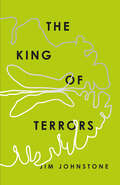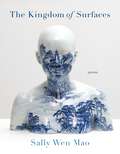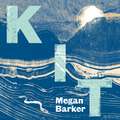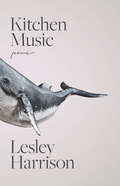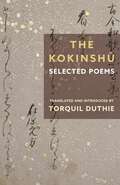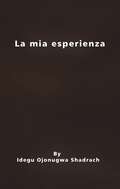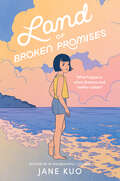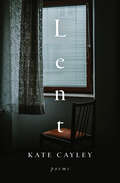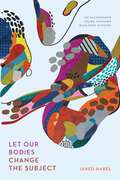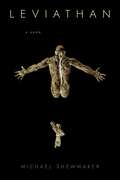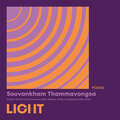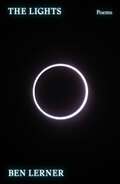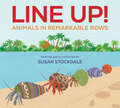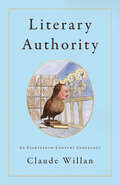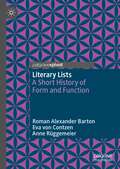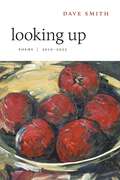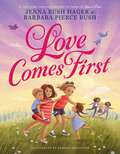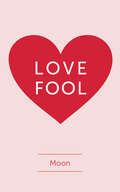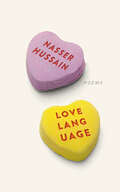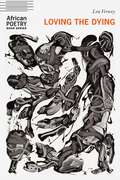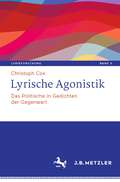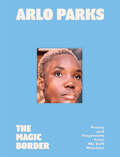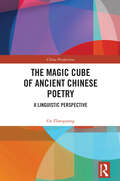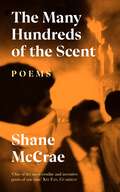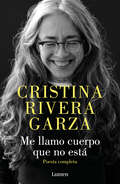- Table View
- List View
The King of Terrors
by Jim JohnstoneCBC BOOKS CANADIAN POETRY COLLECTIONS TO WATCH FOR IN FALL 2023What can we remove from ourselves and still be ourselves? Written after a brain tumour diagnosis early in the pandemic, The King of Terrors is a meditation on living with illness and the forces required to heal. These forces are not always what we expect – they may not even be medical. Jim Johnstone implies that language, relationships, and our immersion in the natural world can free us from the spectre of impending collapse. Haunted by the decimation of the North American landscape and the anxiety of living in a polarized society, Johnstone’s poems are bodily reflections that ask how we can reframe our past to make sense of the present. The King of Terrors oscillates between the personal and the public, the clinical and the spiritual, so we’re never quite sure what we are seeing, no matter how familiar."There is a moving, fierce intensity to The King of Terrors. Jim Johnstone knowingly reminds us that betrayals of the body are also betrayals of language, ‘each bloody / mouthful a sentence fragment.’ These are lines of admission, ambition, and harrowing truth, and Johnstone – despite a future only as certain ‘as the body // it inhabits’ – offers a form of redemption, for the fortitude of the sick, for poetry itself." – Randall Mann, author of Deal: New and Selected Poems"The King of Terrors is a luminous meditation on the otherworld of illness and treatment, contemplating the mysteries of death and the frontiers of mind and body with sharp clarity and radical vulnerability. These mesmerizing, urgent poems admit us not only to waiting rooms and brain scans, but also to the intimate fears that accompany the estranging experience of being unwell, or, as the poet says, living 'between / age and agency.' Haunting, stark, and lyrical, The King of Terrors is charged, as all the best poetry is, with the shock of the mortal." – Sarah Holland-Batt, author of The Jaguar
The Kingdom of Surfaces: Poems
by Sally Wen MaoA virtuosic new poetry collection from Sally Wen Mao, “a consistently inspiring and exciting voice” (Morgan Parker)In The Kingdom of Surfaces, award-winning poet Sally Wen Mao examines art and history—especially the provenance of objects such as porcelain, silk, and pearls—to frame an important conversation on beauty, empire, commodification, and violence. In lyric poems and wide-ranging sequences, Mao interrogates gendered expressions such as the contemporary “leftover women,” which denotes unmarried women, and the historical “castle-toppler,” a term used to describe a concubine whose beauty ruins an emperor and his empire. These poems also explore the permeability of object and subject through the history of Chinese women in America, labor practices around the silk loom, and the ongoing violence against Asian people during the COVID-19 pandemic.At its heart, The Kingdom of Surfaces imagines the poet wandering into a Western fantasy, which covets, imitates, and appropriates Chinese aesthetics via Chinamania and the nineteenth-century Aesthetic movement, while perpetuating state violence upon actual lives. The title poem is a speculative recasting of “Through the Looking-Glass,” set in a surreal topsy-turvy version of the China-themed 2015 Metropolitan Museum of Art Gala. The Kingdom of Surfaces is a brilliantly conceived call for those who recognize the horrors of American exceptionalism to topple the empire that values capital over lives and power over liberation.
Kit
by Megan BarkerMegan and Kit met in their early twenties. Their friendship was intense, wild and true.Years later, when Kit becomes desperately unwell, Megan tries to pull her old friend back from the precipice, navigating the difficulties of revisiting a relationship conceived in the great freedom of youth, whilst attempting to remain fully present in the messy beauty of her family life.Kit is a story of the sumptuous complication - and precariousness - of life and relationships. It describes a call to intimacy in a state of emergency. It is a story of one life disrupted as another moves toward its end.Told in a spare, winding prose-poem, with a voice reminiscent of Max Porter, Elizabeth Smart, Kae Tempest and Rebecca Watson, Kit is a splintered, powerful work of empathy, friendship and unconditional love.
Kitchen Music
by Lesley HarrisonA cosmology of place written in the songs of whales and birds, folk tales, city streets, and the green glass sea In her first book-length collection of poems to appear in the US, Lesley Harrison looks North to the sea, with the heat of the land at her back, to bring us meditations on whale hunts and lost children, Manhattan sky towers, and the sound of the gamelan in the Gulf of Bothnia. A poetry of spareness in multilayered depths, of textural silence and aural place, Kitchen Music plunges deep through the strata of language where “weather is body” and an Iceland poppy is “as delicate as birch.” In poems and sequences of poems, Harrison spins folktales into threads of family and gender, engages with the work of the artists Roni Horn and Marina Rees, transcribes John Cage and Johannes Kepler into song and litany, pens a hymnal of bees, and turns to storms, glaciers, and the lapwing life in a field of young barley. As the novelist Kirsty Gunn writes in the foreword, Harrison has “taken up the old white whale of the fixed and masculine narratives and made of its seas and weathers her own Moby Dick, a female poetry ‘in praises / repeated, repeating.’”
The Kokinshū: Selected Poems (Translations from the Asian Classics)
by Torquil DuthieCompiled in the early tenth century, the Kokinshū is an anthology of some eleven hundred poems that aimed to elevate the prestige of vernacular Japanese poetry at the imperial court. From shortly after its completion to the end of the nineteenth century, it was celebrated as the cornerstone of the Japanese vernacular poetic tradition. The composition of classical poetry, other later poetic forms such as linked verse and haikai, and vernacular Japanese literary writing in its entirety (including classic works such as Murasaki Shikibu’s Tale of Genji and Sei Shōnagon’s Pillow Book) all draw from the Kokinshū.This book offers an inviting and immersive selection of roughly one-third of the anthology in English translation. Torquil Duthie focuses on rendering the poetic language of the Kokinshū as a whole, in such a way that readers can understand and experience how its poems work together to create a literary world. He emphasizes that classical Japanese poems do not stand alone as self-contained artifacts but take part in an ongoing intertextual conversation. Duthie provides translations and interpretations of the two prefaces to the Kokinshū, which deeply influenced Japanese literary aesthetics. The book also includes critical essays on various aspects of the anthology and its history. This translation helps specialist and nonspecialist readers alike appreciate the beauty and richness of the Kokinshū, as well as its significance for the Japanese literary tradition.
La mia esperienza
by Idegu Ojonugwa Shadrach"La mia esperienza" è un poema epico che descrive la mia esperienza con alcune persone che hanno in un modo o nell'altro contribuito ai miei insegnamenti di vita. "La mia esperienza" è una poema epico. Questo poema descrive le esperienze che ho acquisito da differenti tipi di persone che ho incontrato - tutte le esperienze raccolte in uno dei miei momenti più difficili. Lo scopo di queste esperienze, è di voler sempre cambiare la vita delle persone se solo gli attenti studi e le assimilazioni che ne derivano sono presi con priorità e con attenzione . L'ultima strofa tocca l'esperienza che ho sull'umanità su fatti che mostrano come i politici di partiti opposti vogliono assolvere i loro figli al vincolo del matrimonio.
Land of Broken Promises
by Jane KuoTaiwanese immigrant Anna and her family make a shocking discovery that puts their American dreams at risk in this searing companion to In the Beautiful Country, which Gene Luen Yang called “vivid and hopeful.”After a rocky first year, Anna’s family have settled into life in California—their small restaurant is even turning a profit. Then her parents make a shattering discovery: their visas have expired.Anna’s world is quickly overwhelmed by unfamiliar words like “undocumented” and “inequality.” She longs to share the towering secret that looms over every aspect of her life with a friend, but her parents strictly forbid her from telling anyone. As Anna grapples with the complexities of being undocumented, the strain that it places on her family, and the loneliness of keeping it all to herself, she has to wonder—if America is the promised land, why does everything she’s hoped for feel like a lie?Perfect for fans of Kelly Yang, Reem Faruqi, and Jasmine Warga, this middle grade novel in verse, inspired by the author’s own experiences, focuses on themes of legal documentation, identity, and language’s ability to divide and unite.
Lent: Poems
by Kate CayleyIn these peculiar times, we are thrust back into ourselves in a kind of suspension: one in which only private life exists yet threatens to become trivial through a sense of mutual, overarching dread.Lent from award-winning writer Kate Cayley is built from this tension, exploring domestic and artistic life amidst the environmental crisis, and the surprising ways that every philosophical quandary—large and small—converges in the home, in small objects, conversations, moments.Grotesque and tedious, baroque and banal intertwine in the first three sections. Meticulous depictions of spectacle run into the repetition of daily domestic life: trying to explain time to children, day trips to the planetarium and strangers' warnings, intersperse depictions of Mary Shelley recalling the monster, the inner life of a Seventeenth Century portrait sitter, Ted Hughes' second wife telling her story to the dead Sylvia Plath, Rusalski—souls of drowned innocents in the lake.The final, title section, explores religious faith; how belief is itself a repetition, a slow accumulation over time, just like love or forgiveness.Lent is an exquisite work of our era, asking us to contemplate what it means to live in a broken world—and why we still find it beautiful.
Let Our Bodies Change the Subject (The Raz/Shumaker Prairie Schooner Book Prize in Poetry)
by Jared HarélLet Our Bodies Change the Subject is a poetry collection that dives headlong into the terrifying, wondrous, sleep-deprived existence of being a parent in twenty-first-century America. In clear, dynamic verses that disarm then strike, Jared Harél investigates our days through the keyhole of domesticity, through personal lyrics and cultural reckonings. Whether taking a family trip to Coney Island or simply showing his son snowflakes on Inauguration morning, Harél guides us toward moments of intimacy and understanding, humor and grief. &“I will try,&” he admits, &“to be better than myself, which is all/I&’ve ever wanted and everything I need.&” Winner of the Raz/Shumaker Prairie Schooner Book Prize in Poetry, Let Our Bodies Change the Subject is a secular prayer. Hoping against hope, Harél works to reconcile feelings of luck and loss, of living for joy while fearing the worst.
Leviathan: A Poem
by Michael ShewmakerLeviathan, the highly anticipated second collection by Michael Shewmaker, offers an innovative reimagining of the book of Job. Set in the landscape of modern East Texas, the poem unfolds in four cycles of interchanging monologues, each compounding the difficulties of a faith placed in a distant God. With an accomplished music wholly its own, Shewmaker’s verse shifts effortlessly between song and story, unearthing beauty from the deep well of loss and doubt.
Light: Poems
by Souvankham ThammavongsaA beautiful re-issued edition of poetry from the Scotiabank Giller Prize–winning author of How To Pronounce Knife FEATURING A NEW INTRODUCTION BY THE AUTHORWinner of the Trillium Book Award for Poetry Light examines the word that gives the collection its name. There are poems about a sparkle, about how to say light, about a scarecrow, a dung beetle, a fish without eyes. Known for her precision and elegance, for her spare, clear voice, for distilling meaning from details, for not wasting words, Thammavongsa confirms her gifts with these astonishing poems. Light is a work that shines with rigour, humour, courage, and grit.First published in 2013, Souvankham Thammavongsa&’s award-winning third book of poetry is an indispensable contribution to Canadian literature.
The Lights: Poems
by Ben LernerA formally ambitious and intensely felt new volume from the author of 10:04 and The Topeka School.The Lights is a constellation of verse and prose, voice mails and vignettes, songs and felt silences, that brings the personal and the collective into startling relation. Sometimes the scale is intimate, quiet, and sometimes the poems are sweeping, Orphic experiments in the animation of our common world. Written over a span of fifteen years, The Lights registers the pleasures, risks, and absurdities of making art and family and meaning against a backdrop of interlocking, accelerating crises, but for all their insight and critique, Ben Lerner’s poems ultimately communicate—in their unpredictability, in their intensities—the promise of mysterious sources of lift and illumination.
Line Up!: Animals in Remarkable Rows
by Susan StockdaleLine up for this fascinating exploration of animal behavior from an award-winning author-illustrator!Much like humans, many animals line up for a variety of reasons. Rather than forming lines for the school bus or recess, the animals featured in Susan Stockdale&’s book form lines forsafety: baby Mallard ducklings follow their mother to the water for their first swimwarmth: turtles climb into a stacked line for a better share of the sun&’s raysnavigation: Arctic wolves follow the prints in the snow left by the pack leaderfood: ants line up to follow the scent of their leader to food and safetytravel: pink flamingos form a line to reduce wind resistance and fly more efficiently Featuring birds, crustaceans, fish, insects, mammals, and reptiles from around the world, Line Up is a cozy and comforting book that reminds us of our similarities while illuminating some specific, distinctive behaviors.
Literary Authority: An Eighteenth-Century Genealogy
by Claude WillanThis book is the cultural history of an idea which now seems so self-evident as barely to be worth stating: through writing imaginative literature, an author can accrue significant and lasting economic and cultural power. We take for granted, now, that authority dwells in literature and in being its author. This state of affairs was not naturally occurring, but deliberately invented. This book tells the story of that invention. The story's central figures are Alexander Pope and Samuel Johnson. But its narrative begins in the 1680s, with the last gasp of the bond linking literary to political authority. While Jacobite poets celebrated (and mourned) the Stuart dynasty, Whig writers traced the philosophical and aesthetic consequences of the accession of William of Orange. Both groups left behind sets of literary devices ready-made to confer and validate authority. Claude Willan challenges the continued reign of the "Scriblerian" model of the period and shows how that reign was engineered. In so doing he historicizes the relationship between "good" and "bad" writing, and suggests how we might think about literature and beauty had Pope and Johnson not taken literary authority for themselves. What might literature have looked like, and what could we use it for, he provocatively asks.
Literary Lists: A Short History of Form and Function
by Roman Alexander Barton Eva von Contzen Anne RüggemeierThis book provides a concise introduction to lists in literature from the early modern period to the twenty-first century. Tracing the changing functions of the literary list across time, it offers a broad range of case studies which situate selected enumerations in their respective contexts and demonstrate the versatility and creative potential of the list form. Starting with a review of previous research on the literary list, the book discusses four main constellations of enumeration: series and the great chain of being; itemization and enumerative realism; ‘letteracettera’ and experimental list-making; ‘white noise’ and creative exploits of enumeration between formal playfulness and existential exploration. The epilogue offers an analytical toolkit for the study of literary lists based on rhetorical theory.
Looking Up: Poems, 2010–2022
by Dave SmithLooking Up collects more than a decade of new poems by Dave Smith. These include reflections upon events, animals, and people who prove to have a salutary significance to this poet, now approaching his eightieth year. He ponders the substantial changes wrought by retirement, which brings no expectations, no obligations, no role beyond what one has left, which prompts the question, What will you do now? Both the question and its answers are the subject of Looking Up, as Smith gives us poems as acts of attention, raptures, comedies, sardonic narratives, vignettes of grief and joy whose testimony shows that love is surely our core reality.
Love Comes First
by Jenna Bush Hager Barbara Pierce BushA joyful celebration of growing families by former first daughters and #1 New York Times bestselling authors Jenna Bush Hager and Barbara Pierce Bush. <p><p> As two sisters watch their friends’ families grow, they wish on a star for a sibling of their own…and a younger brother and a baby cousin arrive! The new family members aren’t exactly what the sisters expected, but with time and patience, the group soon becomes fabulously four—and lets their imaginations soar! Together they can be anything, and no matter what, they will always remember that love comes first. <p><p> Inspired by Jenna and Barbara’s own families, this companion title to the #1 New York Times bestseller Sisters First is a tender story about the way our hearts can always make room for more. <P><P><i>Advisory: Bookshare has learned that this book offers only partial accessibility. We have kept it in the collection because it is useful for some of our members. Benetech is actively working on projects to improve accessibility issues such as these.</i> <p> <b>New York Times Bestseller</b>
Love Fool
by Moon‘They said never love a fool ’coz your eyes shine in a fool but when love knocks on you grab love like a fool ’coz you are indeed a love fool They said never be a fool ’coz love runs from a fool but when love stands in your eyes you can’t hide a fool ’coz you are the fool’ We live life only once, let’s love freely as far as destiny takes us.
Love Language
by Nasser HussainCBC BOOKS CANADIAN POETRY COLLECTIONS TO WATCH FOR IN FALL 2023In his follow-up to SKY WRI TEI NGS, Nasser Hussain tackles the absurdity of the English language through a modern take love poemsThe term “Love Language” can be read at least three ways: as an imperative, as the signoff to a letter, and as a contemporary way of talking about relationship styles. None of these would be wrong in this book. In his followup to the acclaimed SKY WRI TEI NGS, written entirely in airport codes, Nasser Hussain moves toward a more expansive version of experimentation; in a time of physical lockdown, his pandemic poetics refuse to be confined. And so we have poems that repeat and hypnotize as English becomes more and more absurd, that compare an affair to a relationship with Apple, that list love poems the poet loves. But most of all, we see a deep affection for language: its multiple meanings, the ways it makes us feel, and for the ways that language lets us talk about complicated things playfully, like love. Generously handing out tenderness like a child with a sack full of Valentine's Day cards, the poems of Love Language revel in love's warm glow and make sure there’s enough room for anyone to join. "Think of 'time as a lantern,' suggests Nasser Hussain, in these inimitable poems that take play seriously and allow seriousness to enter the room disguised as incantation. These are poems that long to dismiss the lyric’s most recent pretty mask of polite propriety and instead take us to the lyric’s ancient roots. It started way back, the poet says, 'when a cave person made a grunt,' to speak the name of a thing. Indeed. This is the lyric’s ancient pact with the world: to spin playful language into seriousness of giving things their names—what are we without this speaking, this tune? Hussain knows this and writes beautiful poems—and I, for one, am grateful." – Ilya Kaminsky, author of Deaf Republic"Hussain's humour is never complacent; it is the opposite of a defence mechanism (we are encouraged to imagine such a thing) and wryly sidesteps the bad binary of conservative withdrawal as set against algorithm-envenomed hyperassertion. He puts into words a new masculinity maturer than we deserve, that acknowledges swerves of defiance to be inseparable from underswells of doubt." – Vidyan Ravinthiran, author of The Million-Petalled Flower of Being Here
Loving the Dying (African Poetry Book)
by Len VerweyLoving the Dying is a collection of poems on life&’s different stages. Set against the backdrop of a conflicted society, Len Verwey looks at a person&’s life from youth and growing up to aging and dying, considering what the ineluctable reality of death might imply about how we should think about our lives. These are poems of uncertainty rather than certainty. The more overtly biographical ones end with as many questions as they start with, and there is often sympathy for the outsider or the marginalized voice. Varying in tone and complexity, Verwey&’s poems focus on the tension between escapism and reality, truth and delusion (for individuals and societies), and the need to face death if we are to care for the aged and learn to understand the process of dying. As in his first poetry collection, In a Language That You Know, Verwey continues his effort to understand the successes and failures of the South African post-apartheid journey, with both humor and some despair.
Lyrische Agonistik: Das Politische in Gedichten der Gegenwart (Lyrikforschung. Neue Arbeiten zur Theorie und Geschichte der Lyrik #3)
by Christoph CoxAusgehend von der These, dass es sich bei der politischen Lyrik der Gegenwart vor allem um eine Lyrik des Politischen, eine lyrische Streitkultur handelt, wird in „Lyrische Agonistik. Das Politische in Gedichten der Gegenwart“ auf der Basis einer philosophischen ‚neue‘ Rhetorik und mit Rückbezug auf Ansätze der radikalen Demokratietheorie insbesondere von Chantal Mouffe und Ernesto Laclau eine neuartige rhetorische Methode zur Analyse des Politischen in der Lyrik der Gegenwart entwickelt. Grundlegend für diese Methode ist die von sophistischer Rhetoriktradition und radikaler Demokratietheorie geteilte Skepsis gegenüber allen epistemischen Letztbegründungsversuchen. Das Politische in der Lyrik der Gegenwart erweist sich im Kontext dieser beiden Bezugspunkte als die Zurückweisung fundamentaler Gründungversuche, die sich als diskursive Form der Verhandlung einer nur plausiblen, in ihrer Kontingenz stets angreifbaren Politik äußert. Ablesbar wird diese postfundamentalistische Wende in gegenwärtigen Gedichten anhand von rhetorischen Widersprüchen, die auf den unaufhebbaren konflikthaften Charakter des Politischen hindeuten, deren notwendige Gegenseite der ebenso rhetorisch ausgearbeitete Versuch ist, umstrittene Diskurse zugunsten einer nie letztbegründbaren Position zu hegemonisieren. Aufgezeigt wird das dem Politischen eigene Spiel aus Kontingenzerfahrung und Schließungsbemühungen anhand von drei disparaten Textbeispielen politischer Lyrik der letzten zehn Jahre: Tom Schulz’ „Die Maschinen sind volljährig“, Günter Grass’ „Was gesagt werden muss“ und Monika Rincks „was machen die frauen am sonntag?“.
The Magic Border: Poetry and Fragments from My Soft Machine
by Arlo ParksFrom Arlo Parks, Grammy Award-nominated recording artist and “voice of a generation”—a stunning debut book of poetry and a world-building companion to her sophomore album My Soft Machine.“Poetry was my place, my little clearing in the forest, where I could quietly put everything I was holding. I’m not sure what gave me the courage to open up that space to you but here I am, doing it. I am proud to show you this personal lens that life shimmers through. This book is no longer mine. It is yours.”—Arlo ParksThe Magic Border is the debut book from the Grammy-nominated, Mercury Prize winning musician and poet Arlo Parks. This remarkable collection features Arlo’s handpicked original poems alongside exclusive photographs by friend and collaborator Daniyel Lowden in addition to the complete lyrics to her critically lauded sophomore album My Soft Machine. A deeply personal literary tapestry, The Magic Border beautifully showcases the full breadth of Arlo’s singular artistry.
The Magic Cube of Ancient Chinese Poetry: A Linguistic Perspective (China Perspectives)
by Ge ZhaoguangThis book focuses on the linguistic perspective of classical Chinese poetry and its changes and development in diff erent historical periods. It off ers a combination of theoretical analysis and aesthetic appreciation of exemplary poems. The author discusses the following aspects of classical Chinese poetry: the relationships between background and meaning in the interpretation of a poem; how readers can deal with the tangle of linguistic approach and intuitive perception in interpreting poems; the engagement and disengagement of the poet’s thought fl ow with and from the word order of the verse; the tonal and metrical schemes; and the three special features of classical Chinese poetry: the signifi cance and role of allusions, “Xu Zi”, and “Shi Yan”. Last, the author analyses the development of Chinese poetry from the Vernacular Song Dynasty Style to the Vernacular Modern Style. It will be a great read for students and scholars of East Asian studies, Chinese studies, linguistics, and those interested in Chinese poetry in general. The book aims to lead readers to discover a fresh and amazing world of classical Chinese poetry, a fantastic panoramic picture of its beauty and charm, and a poetic feast that the reader may not otherwise be privileged to enjoy.
The Many Hundreds of the Scent
by Shane McCraeShane McCrae, one of the most powerful voices in contemporary poetry, returns with The Many Hundreds of the Scent, an urgent new collection that brims with lyric force. He expands both the poetic and the personal mythologies that he has been constructing over the course of his career; in addition to introducing his readers to 'the thin king / who eats the world,' McCrae invites them to bear witness to his tangle of childhood memories. In brutal, sorrowful lines, he recounts being kidnapped by his white supremacist maternal grandparents from his Black father as a boy. 'O reader, listener, stay,' McCrae writes. 'You are now evidence.'In The Many Hundreds of the Scent, Homeric figures mingle with those that populate the poet's world. Helen weighs Paris's spear in her hand and bloodies a raging Achilles; Penelope burns her loom each night; Dido watches Aeneas's ship burn on the horizon. A strikingly original and engaging poet, McCrae continually surprises - the collection includes a series of poems about the advent of post-rock and Hex, the debut album of the band Bark Psychosis. With this collection, he has once more crafted an extraordinarily affecting book of poetry. As Kate Kellaway writes in the Guardian, 'In McCrae's hands, poetry is reclamation. It is also transport: writing a way out and through.'
Me llamo cuerpo que no está: Poesía completa
by Cristina Rivera GarzaLa poesía de Cristina Rivera Garza reunida por primera vez en un sólo volumen. «En los poemas de Cristina Rivera Garza hay sopas instantáneas, sillas de plástico color naranja, mandarinas desgajadas, batas de franela, lentejuelas, rímel y risas, una cajera cuando devuelve el cambio, papas fritas, té de menta o té de naranja o té de jazmín, Valium, dos cajas de Marlboro light, trescientas aspirinas, vasos de leche, flores de plástico, botes de basura, escritorios de metal, latas de sardinas, cables de teléfono, ambulancias, rocolas. También hay personajes como la Mujer Enorme, la Ex-durmiente,la Ex-Muerta, la Diabla, la Bestia, Los Sumergidos, los Desamparados y los Solos y los de Tres Corazones Bajo el Pecho. Además de algunas de las frases con las que suelen iniciar los cuentos infantiles —para sumergirnos en una suerte de ensoñación o enrarecimiento,propicios de la clase de historias que estamos a punto de leer—: Había una vez. O dos. Érase que se era. Érase que fue o que habría sido. La poesía de Cristina Rivera Garza es una carretera bífida: un camino que se bifurca entre la materialidad más tangible y rotunda y la posibilidad de lo contingente, de lo que podría o no suceder. Sus poemas son un lugar donde es viable que lo que es sea; pero, sobre todo, y como anhelaba Alejandra Pizarnik: que sea lo que no es.» Del prólogo de Sara Uribe.
